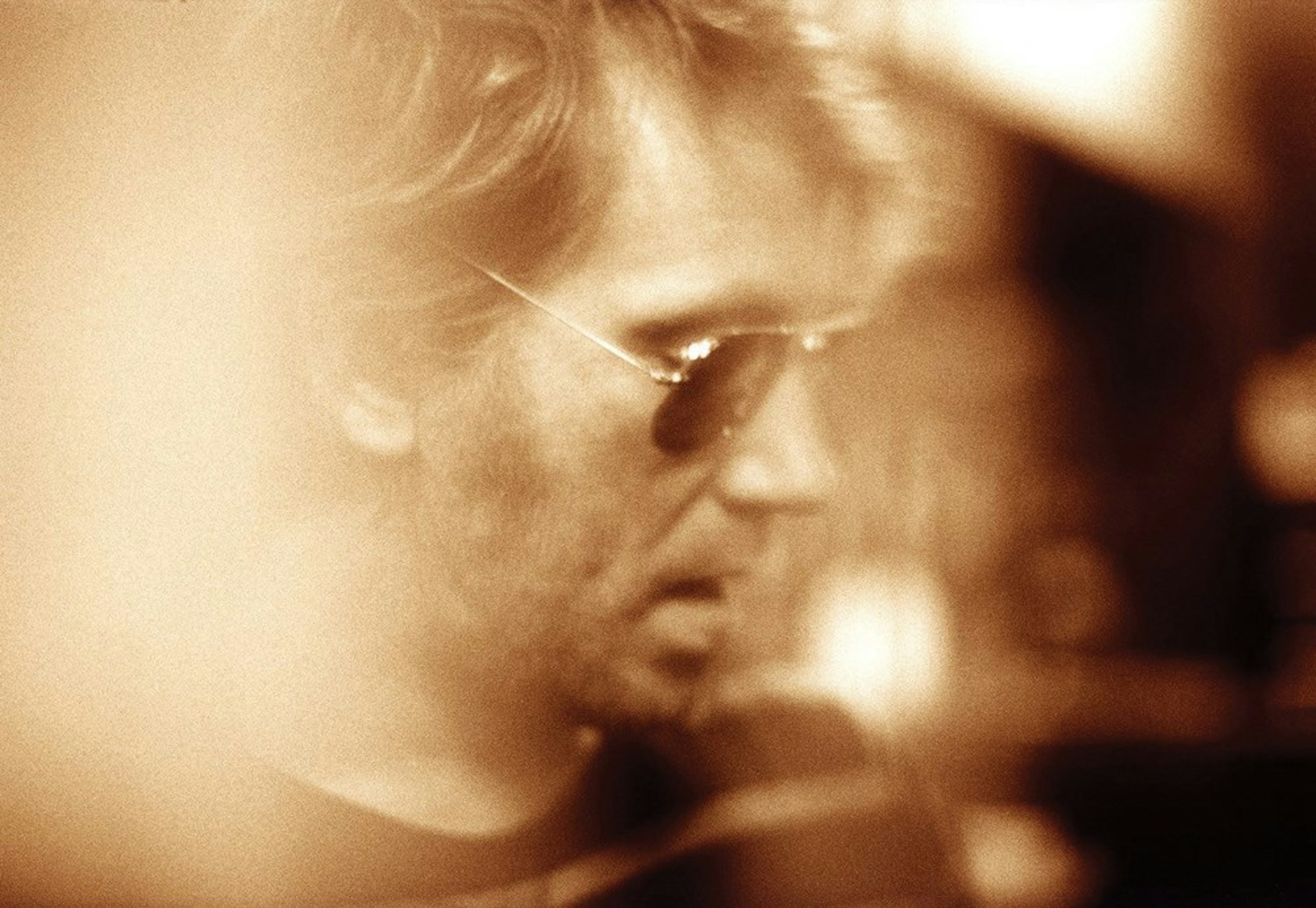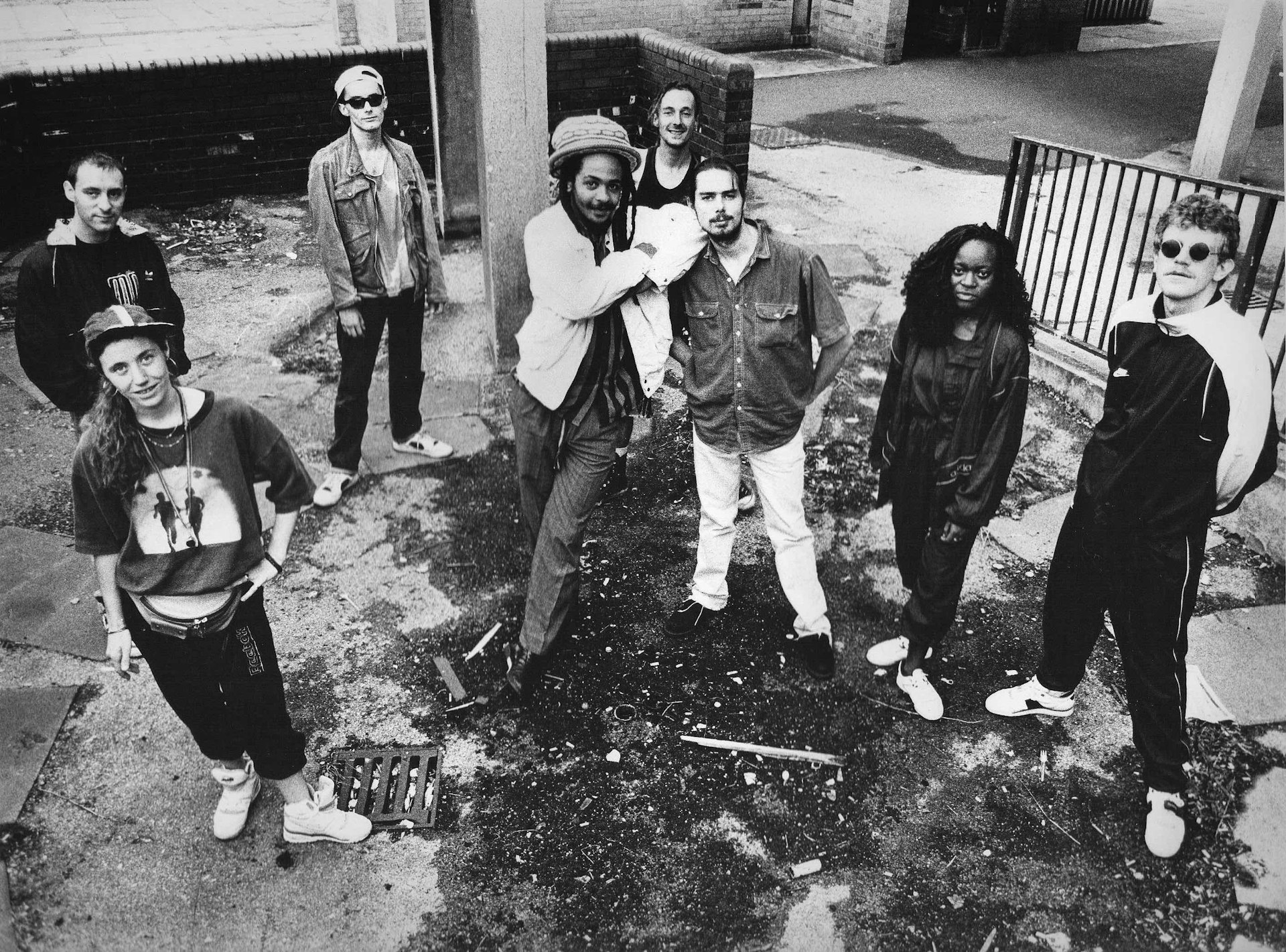
‘Politics is a complete fucking shit show’
- Text by Jeremy Allen
“I had nine brothers and sisters which meant I inherited so much music,” says David Holmes on the phone from his home in Belfast. The DJ turned film soundtrack composer started his musical life as a pre-teen punk, but when he saw Quadrophenia on VHS in the ’80s he says it “changed everything”. His expanding palate took in R&B, modern jazz, acid house and then film scores, the latter of which would come in handy when he started making soundtracks for directors like Steven Soderbergh, Harold Ramis and Steve McQueen.
His debut album, 1995’s This Film’s Crap Let’s Slash The Seats, led to his first work in television, and his lauded follow up, Let’s Get Killed, introduced him to Soderbergh and eventually the Oceans franchise. In 2008, he made a very personal record he sang on himself called The Holy Pictures, with songs about his late parents and about growing up in the thick of the troubles in the Northern Irish capital. After that, a rockier album then made its way into the Olympics 2012 opening ceremony. “And it’s like that with all my records; they come out and they’re pretty well-received and do nothing,” he says, laughing. “You make records, they do nothing, but then eventually they find a home and get a second life in cinema or television.”
Holmes has also produced Primal Scream and Noel Gallagher, and his latest project is the forthcoming Killing Eve soundtrack which he’s involved with in two capacities. On one level he’s been curating cool cuts from the likes of Brigitte Bardot, Anna Karina, Etienne Daho, Cat’s Eyes and Jade Weaver, alongside BBC co-music supervisor Catherine Grieves. He has also provided a further 21 tracks from his own band Unloved. Formed in 2011 with singer Jade Vincent and soundtrack composer Keefus Ciancia, Unloved channel early ’60s girl groups, European cinematic soundtracks and nascent post-war electronica. The trio formed when Holmes lived in Los Angeles, though he and his family moved back to Northern Ireland in 2012.
Killing Eve works incredibly well with Unloved’s music. When you’re sent a script, is it intuition that suggests they might work well together?
The only thing I can say about Unloved and that marriage to Killing Eve is that it was serendipitous. It was a complete accident. We’d made that music seven years before and yet when Killing Eve arrived on my doorstep it just fit like a glove. And you can’t explain that or understand it apart from it just being this crazy alchemy that made these two things fit together. We could have been easily overlooked and someone else could have done that series and done something completely different.
Has this association with a popular TV show been a boon for you?
If Unloved had made that record in the ’90s and Killing Eve had been a hit show then, then our records would have been multi-platinum. If you go on Spotify our first album has had six million listens and our second album is at three million, and yet the revenue created from that is nothing. It’s crazy. But there are different revenues in terms of performance, and actually it really benefits the live shows. We have a really good fan base now and the shows sell out, so it’s swings and roundabouts. Listen, I’m not complaining at all – if it wasn’t for Killing Eve very few people would have heard about Unloved.
Your initial inspiration for Unloved was the girl groups from 1959 and 1963. Do you agree with John Waters’ assessment that the Beatles came along and ruined rock and roll?
[Laughs] No. I mean come on, every genre has to evolve and they took rock and roll somewhere completely new and paved the way for so many acts after that. When I was living in LA and we started this project, in my mind I was basically Phil Spector or Shadow Morton and the girl group thing felt like a really great avenue to go down. I was listening to the Ronettes and the Crystals and the Shangri-Las when I was 15 or 16 so those records are part of my DNA. We were in this incredible studio that had been around since 1930 in Los Angeles, so I was taking its sound and bringing it into the modern world while incorporating the spirit of primitive electronic artists like Raymond Scott and Delia Derbyshire.
Have you always been as into film as you are into music?
To be honest with you – and this is something I’ve only realised in the last few years – I grew up in Belfast in the ’70s and ’80s in the heart of the troubles so there was so much time as a young lad where I wasn’t allowed out. There was a lot of trouble constantly happening on your doorstep so you spent a lot of time watching films. In the ’80s it was a really dark time, and we had the invention of the video recorder. I’d devour films on a nightly basis. And this is back in the day when you went to people’s houses and you’d knock on their door and then rifle through their black market video collection while the whole family ate their dinner.
You’ve done a few soundtracks related to the troubles. Was it an emotional or even a cathartic experience writing the scores for ’71 and Steve McQueen’s Hunger?
I really enjoy working on things of an optimum level like those films, because there’s been so much bad cinema made about Northern Ireland and people have these ridiculous notions about what was going on. As it’s something I lived through, I knew musically what I shouldn’t be doing, like bringing out the uilleann pipes and the bodhrán! When I did ’71, one of the main influences was John Carpenter. That reflected my life growing up in Belfast, or movies like The Warriors… You’d go to see a band or go to a party and then you’d have to navigate your way through certain areas and get home in one piece. It wasn’t just about Catholics and Protestants, it was about avoiding paramilitaries who were on the street looking for their next kill, or the security forces colluding with certain paramilitaries.
We grew up as a Catholic family living in a mixed area, and my brother’s best friend was shot at the end of our street. My dad was basically told ‘get rid of your son or he’s going to get whacked’. My brother came home from work and his bags were packed. ‘Who’s bags are these?’ he said. ‘Yours. You’re going to live in Chicago’. And I had another brother who left because he was sick of being bullied and beaten up not just for being a Catholic but by security forces and members of the British Army and the UDR.
Do you think David Cameron thought about any of this when he called the referendum?
Of course he didn’t. Because he’s obviously not the sharpest tool in the box. He’s so detached from reality that he didn’t for one second realise. It’s a bit like Jacob Rees Mogg saying people should have used their common sense when they were trapped in a burning building. It just shows you how detached these people are from society and they’re all living in a bubble. The whole thing is a complete fucking shit show.
Follow Jeremy Allen on Twitter.
Enjoyed this article? Like Huck on Facebook or follow us on Twitter.
